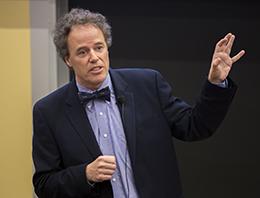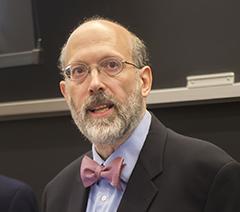Unlearning Due Process?
Historian KC Johnson, Who Helped Expose False Rape Accusations Against Duke Lacrosse Players, Warns of Threats to Due Process in a Talk Sponsored by the Center on Law and Liberty and the Federalist Society
New York, April 21, 2015—A recent movement pushing colleges and universities to more aggressively respond to sexual assault allegations has led to skewed complaint processes that are dangerously weighted against the accused, said historian KC Johnson in an April 6 talk at Columbia Law School sponsored by the Center on Law and Liberty and the Federalist Society.
| KC Johnson discusses due process in sexual assault cases on college campuses. |
Johnson, a history professor at Brooklyn College and the City University of New York Graduate Center, wrote a widely-read blog analyzing the rape accusations against Duke University men’s varsity lacrosse players as they unfolded in 2006 and 2007 and co-authored the book Until Proven Innocent: Political Correctness and the Shameful Injustices of the Duke Lacrosse Rape Case. In that case, a young African-American woman falsely accused three white members of the Duke lacrosse team of rape and, despite inconsistencies in her allegations and exculpatory DNA evidence, the local prosecutor indicted the trio. The team was subject to social ostracism on campus, including a public letter from 88 Duke faculty members thanking student protestors who had, among other suggestions, called for the team captains to be castrated. After charges were dropped in spring 2007, more than a year after the initial accusations, the prosecutor was disbarred and the accuser later convicted of second-degree murder in an unrelated case.
After an introduction from Philip Hamburger, Maurice and Hilda Friedman Professor of Law and director of Columbia Law School’s Center on Law and Liberty, Johnson argued that a moral panic about sexual assault and “rape culture” on campus is driving similar rushes to judgment at schools across the nation, including recently at the University of Virginia following an inflammatory and later discredited article in Rolling Stone. He said that, while sexual assault is a heinous crime that should land perpetrators in jail, statistics widely cited by Senator Kristin Gillibrand (D-NY) and others asserting that one out of five college students suffers sexual assault are misleading and inaccurate.
“The one in five statistic would look like the Congo, where rape is used as a weapon of war,” Johnson said, pointing to Bureau of Justice statistics showing 6.1 sexual assaults per 1000 college students. “The chances of 18 to 24 year olds getting assaulted are actually greater among non-students.”
| Professor Philip Hamburger, director of the Center on Law and Liberty, introduces Johnson. |
Johnson said officials at the Office of Civil Rights in the Obama administration’s Department of Education have expansively reinterpreted Title IX, which prohibits sex discrimination among educational institutions receiving federal funding, to pressure colleges and universities into adopting administrative complaint processes that marginalize the accused, use a broader definition of sexual assault than the general public understands, and make finding culpability more likely. He pointed out that many schools’ policies refer to accusers as “victims,” thus preemptively accepting their claims, and highlighted examples of institutions that do not allow the accused to introduce evidence, question accusers, or even be informed of the exact allegations against them.
“Media coverage of these cases doesn’t usually go into the complaint process, so readers assume that it’s basically fair,” Johnson said. “The public has developed an understanding of what sexual assault means, and the standards at colleges are light years from those expectations.”
While expressing grave concerns about how complaint processes and presumptions of guilt discriminate against the accused and chill academic freedom, Johnson was hopeful that schools and officials in the Department of Education will eventually return to the traditional American norm of innocent until proven guilty.
“We are in a period of flux where the short-term prospects are not particularly positive,” Johnson said, “but I suspect that in five or ten years we’ll look back and these policies will be widely seen as an overreaction.”
Johnson’s talk was made possible by the generous support of the Mailman Foundation.

